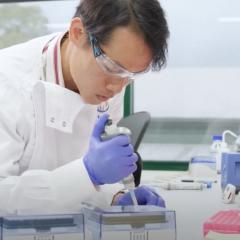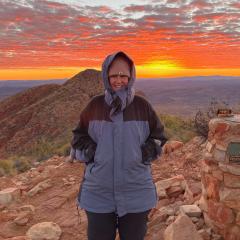Donor generosity paired with research excellence is forging a bright new future for reproductive medicine at The University of Queensland.
International fertility expert, Professor Hayden Homer, has been appointed The Professor Christopher Chen Chair of Reproductive Medicine at UQ’s School of Medicine – a position made possible through a gift of $10.5 million from distinguished UQ alumnus and renowned clinician-researcher, Professor Christopher Chen.
In his role as chair, Professor Homer will lead a new UQ Oocyte Biology Laboratory at the Centre for Clinical Research (UQCCR).
The high-profile reproductive expert said he was honoured to be appointed as The Professor Christopher Chen Chair of Reproductive Medicine and would use his position to make a global impact in fertility research.
“The research focus of the Oocyte Biology Lab will be to understand the building blocks for “good eggs” – knowledge that is fundamental to reproduction,” Professor Homer said.
“Our work will benefit all women, but particularly those in their late thirties who are finding it difficult to have children.”
Infertility affects 1 in 6 couples of reproductive age in Australia and while in-vitro fertilisation (IVF) is a very effective option for many, it doesn’t help everyone.
Professor Homer said oocyte biology could offer another avenue to help couples to conceive.
“Female fertility diminishes with age due to a decline in the quality of the oocyte, the cell in the ovary which can become the ovum (or egg) ready for fertilisation,” he said.
“To develop new treatments, we need to understand the essential building blocks for making a good egg and why it becomes increasingly difficult for eggs to produce healthy pregnancies as women get older.”
UQCCR Acting Director Professor Greg Rice said he was thrilled to welcome Professor Homer to lead the new oocyte laboratory.
“Professor Homer is internationally recognised for his expertise in reproduction and fertility research and as a clinician-scientist, he undertakes research alongside practice as a fertility specialist.”
Professor Homer was previously co-director of The University of New South Wales’ Oocyte Biology Research Unit.
Prior to a move to Australia in 2014, he was a senior lecturer and consultant sub-specialist in reproductive medicine at University College London (UCL), providing clinical leadership for IVF and recurrent miscarriage and leading research into mammalian oocytes at UCL’s Institute for Women’s Health.
Professor Homer also held fellowships from Wellbeing of Women (the research charity of the UK’s Royal College of Obstetrics and Gynaecology), and the Wellcome Trust, and received numerous prizes and awards, including the prestigious Medical Research Society/Academy of Medical Sciences Young Investigator Award.
In recent years, Professor Homer used innovative NanoString technology to analyse human oocytes for the first time, and was sole editor for Mammalian Oocyte Regulation, one of the foremost handbooks on mammalian oocyte research.
Since relocating to Australia, he has secured more than $1 million in National Health and Medical Research Council funding and published work in premier journals including: Science, Genes & Development, Nature Cell Biology, Development and Developmental Cell.
Media: Professor Hayden Homer, 07 3346 5024 or h.homer@uq.edu.au; Jenny Johnston, Marketing Communications Officer, UQ Centre for Clinical Research (UQCCR), 07 3346 6041, 0438 753 471 or j.johnston2@uq.edu.au.



